 Computer Tutorials
Computer Tutorials
 System Installation
System Installation
 What to do if there is a blue screen after restarting the computer
What to do if there is a blue screen after restarting the computer
What to do if there is a blue screen after restarting the computer
When using a computer, you will inevitably encounter system crashes, data loss, etc., which will cause a blue screen on the computer. For the blue screen when restarting the computer, the editor here provides you with three solutions. Method 1: Use System Restore to undo recent changes. Method 2: Scan for malware and viruses. Method 3: Check your computer for hard drive and memory errors. Friends can choose the appropriate solution according to the situation they encounter.

What to do if there is a blue screen after the computer restarts
Solution 1. Use System Restore to undo recent changes
System Restore function in Windows is a handy troubleshooting tool that helps you restore your computer to the state it was in when the system last functioned properly. System Protection automatically creates restore points before installing new apps, drivers, or system updates, but you can also create restore points manually. System Restore will not affect your personal files, such as emails, documents, or photos, but it will delete apps, drivers, and updates that were installed after the restore point was generated.
The specific steps are as follows:
① Click the "Start" button in the lower left corner of the screen or search with Cortana. In the search box, enter "system restore." Then click "Create Restore Point" in the search results page.
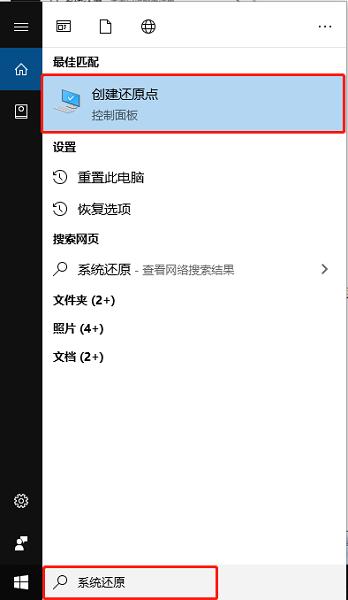
② In the window that opens, select the drive you want to restore, and then click "System Restore".
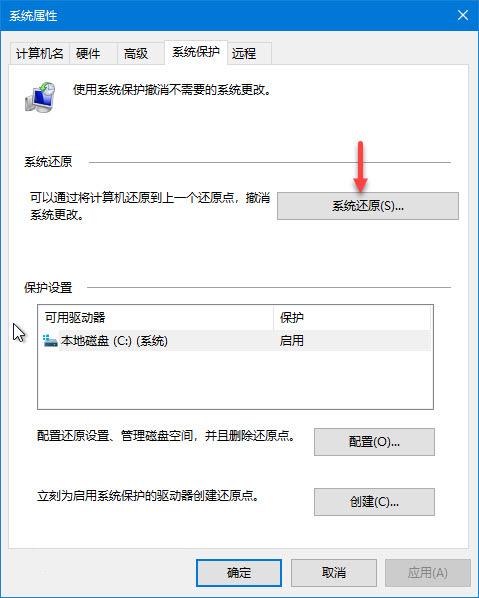
③ Select any existing restore point and click "Next".
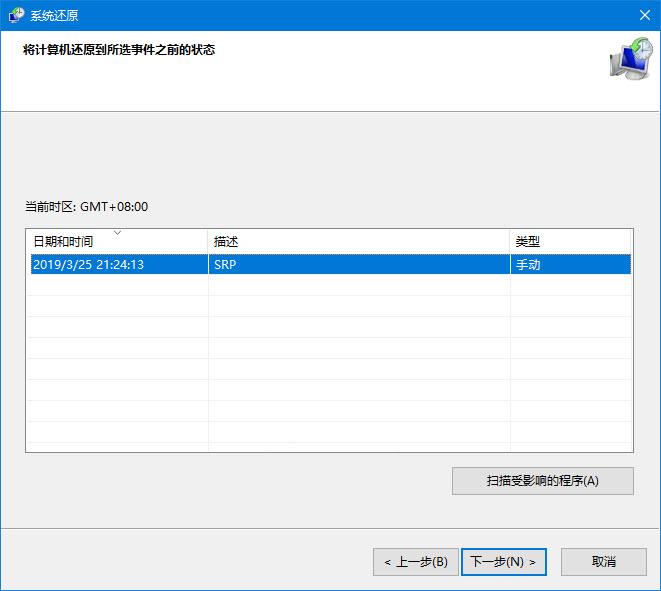
④ After confirming all the information, click "Finish" > "OK". If there is no blue screen after this, your issue may be software related.
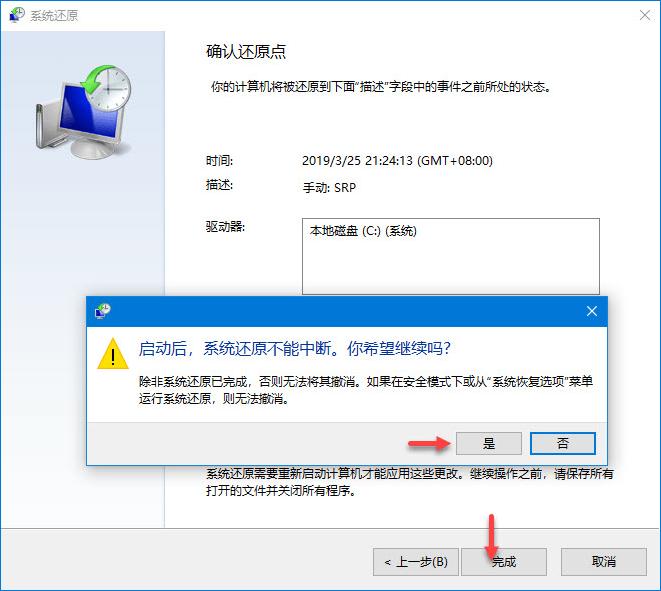
Solution 2: Scan for malware and viruses
When malware damages Windows system files, it is likely to cause a blue screen on the computer. In addition, certain viruses may also cause a blue screen of death, especially those that infect the master boot record (MBR) or boot sector. In order to avoid blue screens on your computer, you should use anti-virus software with strong anti-virus capabilities to fully scan your computer to detect the presence of viruses and malware. Before scanning your computer, you need to make sure that the anti-virus software has been updated to the latest version.
Solution 3: Check your computer for hard disk and memory errors
The occurrence of blue screen errors may be caused by the computer's hard disk or random access memory (RAM). The Windows system comes with hardware detection and repair tools. You can try to detect the problem yourself first. If the problem cannot be solved, you can contact the hardware manufacturer.
1. Check hard drive errors
The disk check program that comes with the Windows 10 operating system can repair general logical errors, but if there are physical bad sectors on the hard disk, you will not be able to use this program to repair it. repair.
The specific steps are as follows:
① Double-click to open "Computer/This PC", then right-click the hard drive you want to check, and then click "Properties".
② Click the "Tools" tab, then click "Inspect". If you are prompted for your administrator password, follow the instructions to enter it and confirm it.
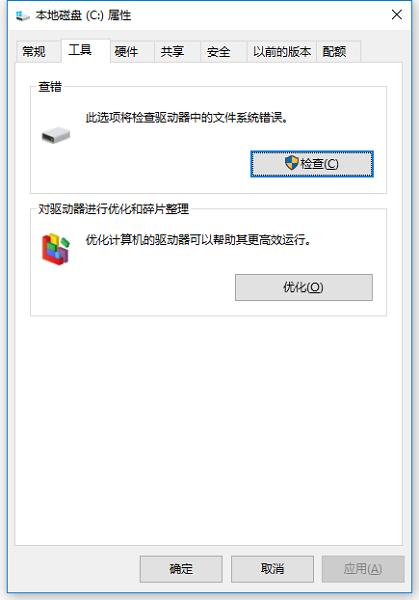
③ Click "Scan Drive" and wait for the scan to complete. If you have a Windows 7 computer, select "Automatically fix file system errors" or "Scan and try to recover bad sectors."
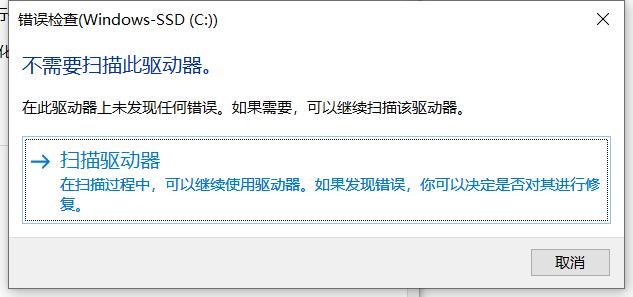
2. Check the computer memory problem
The specific steps are as follows:
① Click "Start" search or Cortana search box , enter "Control Panel" and click to enter.
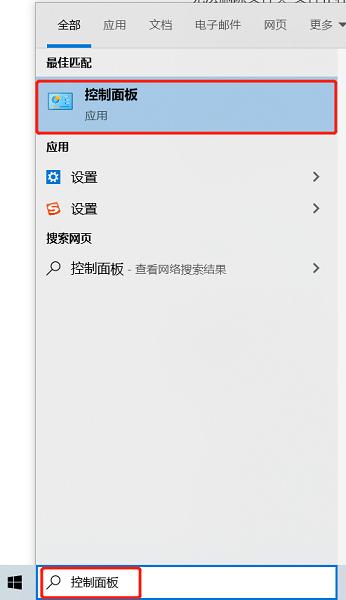
② In the search box, enter "memory" and click "Diagnose computer memory problems".
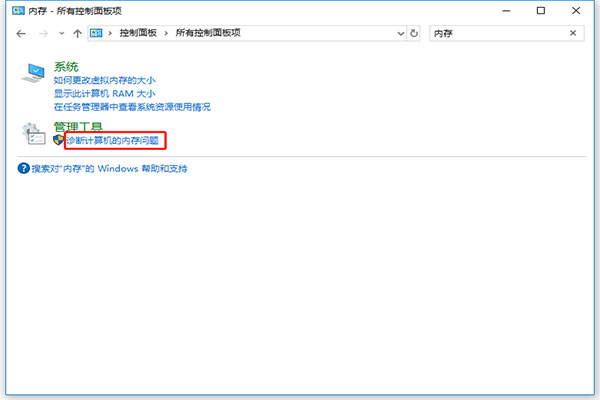
#③ In the pop-up window, choose when to check for memory problems. You can choose to restart now or check for problems the next time you restart. If you choose to restart now, make sure you save your files and close all running programs. When you restart Windows, the Memory Diagnostic Tool will run automatically.
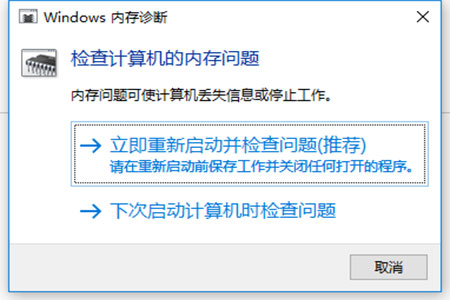
The above is the detailed content of What to do if there is a blue screen after restarting the computer. For more information, please follow other related articles on the PHP Chinese website!

Hot AI Tools

Undress AI Tool
Undress images for free

Undresser.AI Undress
AI-powered app for creating realistic nude photos

AI Clothes Remover
Online AI tool for removing clothes from photos.

Clothoff.io
AI clothes remover

Video Face Swap
Swap faces in any video effortlessly with our completely free AI face swap tool!

Hot Article

Hot Tools

Notepad++7.3.1
Easy-to-use and free code editor

SublimeText3 Chinese version
Chinese version, very easy to use

Zend Studio 13.0.1
Powerful PHP integrated development environment

Dreamweaver CS6
Visual web development tools

SublimeText3 Mac version
God-level code editing software (SublimeText3)
 How to uninstall MySQL and clean residual files
Apr 29, 2025 pm 04:03 PM
How to uninstall MySQL and clean residual files
Apr 29, 2025 pm 04:03 PM
To safely and thoroughly uninstall MySQL and clean all residual files, follow the following steps: 1. Stop MySQL service; 2. Uninstall MySQL packages; 3. Clean configuration files and data directories; 4. Verify that the uninstallation is thorough.
 What are the common misunderstandings in CentOS HDFS configuration?
Apr 14, 2025 pm 07:12 PM
What are the common misunderstandings in CentOS HDFS configuration?
Apr 14, 2025 pm 07:12 PM
Common problems and solutions for Hadoop Distributed File System (HDFS) configuration under CentOS When building a HadoopHDFS cluster on CentOS, some common misconfigurations may lead to performance degradation, data loss and even the cluster cannot start. This article summarizes these common problems and their solutions to help you avoid these pitfalls and ensure the stability and efficient operation of your HDFS cluster. Rack-aware configuration error: Problem: Rack-aware information is not configured correctly, resulting in uneven distribution of data block replicas and increasing network load. Solution: Double check the rack-aware configuration in the hdfs-site.xml file and use hdfsdfsadmin-printTopo
 Centos stops maintenance 2024
Apr 14, 2025 pm 08:39 PM
Centos stops maintenance 2024
Apr 14, 2025 pm 08:39 PM
CentOS will be shut down in 2024 because its upstream distribution, RHEL 8, has been shut down. This shutdown will affect the CentOS 8 system, preventing it from continuing to receive updates. Users should plan for migration, and recommended options include CentOS Stream, AlmaLinux, and Rocky Linux to keep the system safe and stable.
 How to build a website for wordpress host
Apr 20, 2025 am 11:12 AM
How to build a website for wordpress host
Apr 20, 2025 am 11:12 AM
To build a website using WordPress hosting, you need to: select a reliable hosting provider. Buy a domain name. Set up a WordPress hosting account. Select a topic. Add pages and articles. Install the plug-in. Customize your website. Publish your website.
 Detailed explanation of the installation steps of MySQL on macOS system
Apr 29, 2025 pm 03:36 PM
Detailed explanation of the installation steps of MySQL on macOS system
Apr 29, 2025 pm 03:36 PM
Installing MySQL on macOS can be achieved through the following steps: 1. Install Homebrew, using the command /bin/bash-c"$(curl-fsSLhttps://raw.githubusercontent.com/Homebrew/install/HEAD/install.sh)". 2. Update Homebrew and use brewupdate. 3. Install MySQL and use brewinstallmysql. 4. Start MySQL service and use brewservicesstartmysql. After installation, you can use mysql-u
 CentOS Stream 8 troubleshooting methods
Apr 14, 2025 pm 04:33 PM
CentOS Stream 8 troubleshooting methods
Apr 14, 2025 pm 04:33 PM
CentOSStream8 system troubleshooting guide This article provides systematic steps to help you effectively troubleshoot CentOSStream8 system failures. Please try the following methods in order: 1. Network connection testing: Use the ping command to test network connectivity (for example: pinggoogle.com). Use the curl command to check the HTTP request response (for example: curlgoogle.com). Use the iplink command to view the status of the network interface and confirm whether the network interface is operating normally and is connected. 2. IP address and gateway configuration verification: Use ipaddr or ifconfi
 Steps to add and delete fields to MySQL tables
Apr 29, 2025 pm 04:15 PM
Steps to add and delete fields to MySQL tables
Apr 29, 2025 pm 04:15 PM
In MySQL, add fields using ALTERTABLEtable_nameADDCOLUMNnew_columnVARCHAR(255)AFTERexisting_column, delete fields using ALTERTABLEtable_nameDROPCOLUMNcolumn_to_drop. When adding fields, you need to specify a location to optimize query performance and data structure; before deleting fields, you need to confirm that the operation is irreversible; modifying table structure using online DDL, backup data, test environment, and low-load time periods is performance optimization and best practice.
 How to update the image of docker
Apr 15, 2025 pm 12:03 PM
How to update the image of docker
Apr 15, 2025 pm 12:03 PM
The steps to update a Docker image are as follows: Pull the latest image tag New image Delete the old image for a specific tag (optional) Restart the container (if needed)






